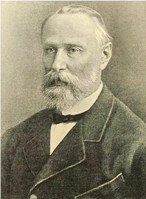
Birthday anniversary of Mikhail N. Katkov, prominent public figure, publicist, publisher
1 (13) November 1818, in Moscow, in the family of a petty official was born journalist, publisher, literary critic and essayist Mikhail Nikiforovich Katkov.
Katkov had lived his childhood and adolescence in poverty. He was educated at home, then continued his education in the Preobrazhensky Orphan School, the 1st Moscow classical school and at a private boarding school. In 1834, Mikhail joined the Philological (soon transformed into Historical and Philological) Department of the Moscow University and in 1838 graduated with honors. While still a student, he met and became friends with future renowned public figures - N. V. Stankevich, V. G. Belinsky, A. I. Herzen, M. A. Bakunin, V. P. Botkin, etc.
Katkov made his printing debut in 1838, when he published in the magazine "Moscow observer" the translation of a number of philosophical works and fictions. He soon became one of the regular contributors of the journal “Otechestvennye Zapiski” (Russian: "Annals of the Fatherland"), regularly publishing his reviews of various articles and books, translations of foreign authors and bibliographical notes.
In 1840, Katkov went abroad to complete his education. For two years he was a volunteer at the University of Berlin, where he met the famous German philosopher F. Schelling, and visited Belgium and France. After returning to Russia, Katkov finally disagreed with Belinsky and Bakunin, and ceased cooperation with “Otechestvennye Zapiski,” to devote himself to research activities. In 1845, he defended his master's thesis "On elements and forms of Slavic-Russian language", became an associate in the department of philosophy at Moscow University, and for five years he had been teaching logic, psychology, history, philosophy and other disciplines. In 1850, due to changes in the university system and the transfer of the teaching of philosophy in the hands of priests and theologians, Katkov returned to journalism, and soon became the editor of the newspaper "Moscow Vedomosti", and was appointed deputy for special assignments at the Ministry of Education.
In 1856, Katkov became the founder and editor of the new literary and political journal, "Russian Messenger". In the short time he had managed to attract to cooperation many prominent intellectuals, scholars, writers and public figures, which allowed "Russian Messenger" to take the leading position in the national socio-political and critical journalism, and Katkov become famous and influential journalist and critic.
In 1863, Katkov, together with his friend and associate, philologist P. M. Leontiev headed the newspaper "Moscow Vedomosti," which soon became the house journal in Russia. Conservative-patriotic position of the paper, as well as an extremely influential position of Katkov as a journalist and thinker, largely determined the public policy. This reflected, in particular, in a determined and brutal suppression of the Polish uprising of 1863-1864.
On the pages of "Vedomosti" Katkov vehemently denounced representatives of nihilism, making thus a lot of enemies and opponents among the liberal and democratic movements, among whom were A. I. Herzen, N. G. Chernyshevsky, M. E. Saltykov-Shchedrin. He later expressed his conservative and opposition position towards the reforms of Alexander II, which had largely predetermined their cutting down by mid 1870s. In 1868, Katkov and Leontiev at their own expense opened a new school - Moscow Imperial Lyceum in memory of Tsesarevich Nikolai, who soon became one of the most privileged educational institutions. Among its graduates were many prominent military leaders, statesmen and religious figures and scholars.
After the assassination of the Emperor Alexander II, Katkov, having finally taken the position of the radical conservative reaction, was a supporter of the hard course of Alexander III in domestic policy and made friends with K. P. Pobedonostsev.
Michael Nikiforovich Katkov died July 20 (August 1) 1887, in his estate Znamenskoye-Sadki, Podolsky District, Moscow Province at the age of 68.
Lit.: Катков М. Н. Собрание передовых статей по польскому вопросу 1863-64: В 3 т. М., 1887; Любимов H. A. M. H. Катков и его историческая заслуга, СПб., 1889; Неведенский С. М. Катков и его время, СПб., 1888; Поночевный М. А. Имперское сознание и образ Польши в мифологемах М.Н. Каткова // Современные гуманитарные исследования. 2008, № 1; Сементковский Р. И. М. Н. Катков, его жизнь и литературная деятельность. СПб., 1891; Твардовская В. А. Идеология пореформенного самодержавия (М. Н. Катков и его издания). М., 1978; Тесля А. А. «Польский вопрос» в публицистике М. Н. Каткова 1863 г. [Электронный ресурс] // Хронос. 2000. URL: http://hrono.ru/libris/pdf/tesla_aa_katkov1863.pdf; Шипилов С. Н. Эволюция идеологии русского пореформенного консерватизма: этнокультурные и политические аспекты (по произведениям М. Н. Каткова): Дис. … канд. ист. наук. М., 2009.
Based on the Presidential Library’s materials:
Катков М. Н. О женском образовании. М., 1897;
Катков М. Н. Собрание передовых статей Московских ведомостей. М., 1863-1887;

